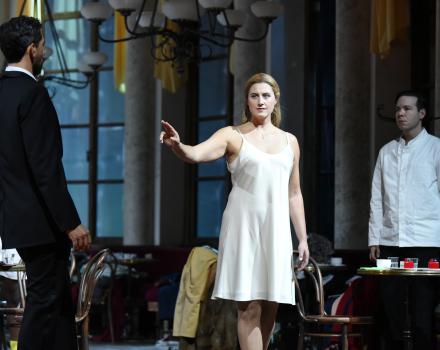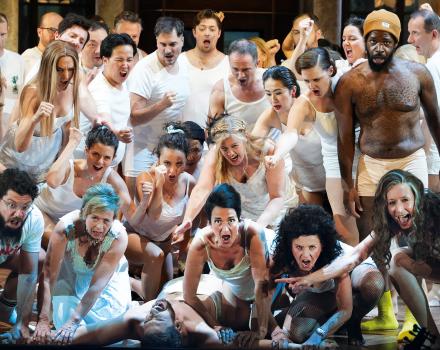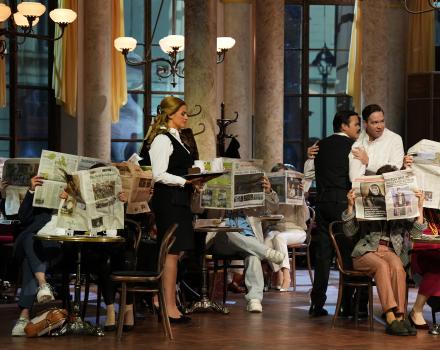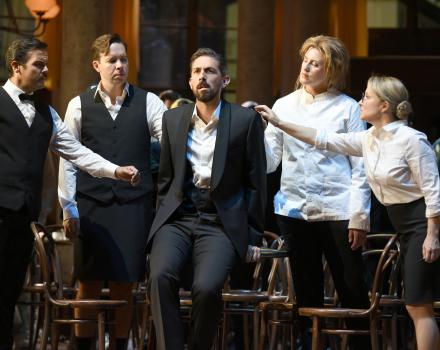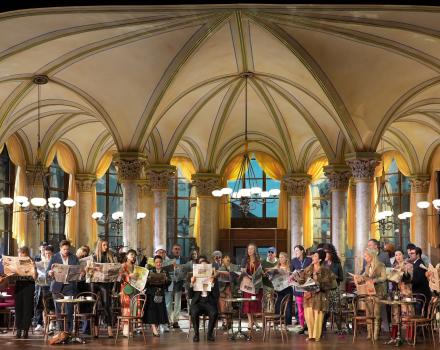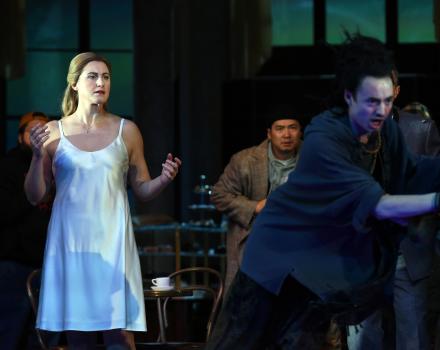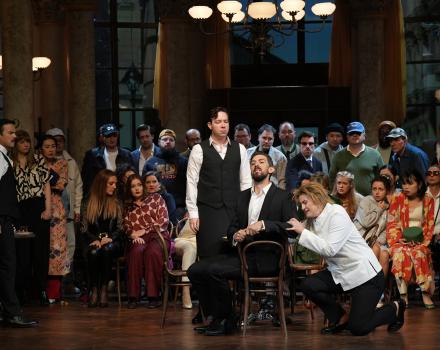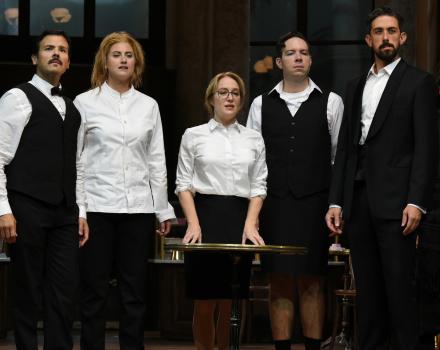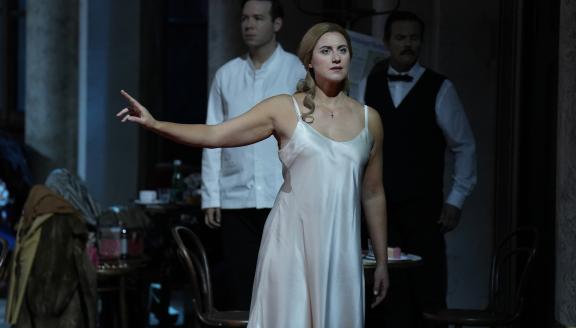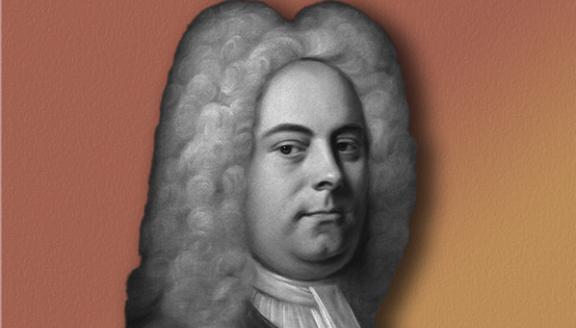Theodora

For Theodora, a princess who has converted to Christianity, earthly existence means nothing compared to the promise of eternal salvation. She disobeys the command issued by the Roman Emperor to worship Jupiter, preferring instead to die in the name of freedom of religion.
First performed in London in 1750, Handel's penultimate work was written when he was in his early 60s. The only one of his oratorios based on a Christian subject, Handel and his librettist Thomas Morell moved away from the dramatic potential of the martyr’s legend and instead focused on the protagonist’s inner conflict, thereby creating a contemplative work about religious tolerance, Christian virtues and humanist values. This new approach inspired Handel to write a score of unprecedented musical introspection and he considered it to be his favourite oratorio. The score conjures up every musical colour and nuance to exalt virtue and faith. The composer alternates majestic pages illustrating the violence of the Romans with the compassion of the Christians. For director Stefan Herheim, this makes Theodora a beacon in the history of musical theatre which takes on new relevance against the background of the spiritual vacuum of consumerism and the lack of spiritual direction that characterise our times. The globally celebrated countertenor and Handel specialist Bejun Mehta debuts as a conductor at MusikTheater an der Wien with the La Folia Barockorchester.
CAST
Theodora | Jacquelyn Wagner |
|---|---|
Didymus | Christopher Lowrey |
Septimius | David Portillo |
Valens | Evan Hughes |
Irene | Julie Boulianne |
Orchestra | La Folia Barockorchester |
Chorus | Arnold Schoenberg Chor |
| ... | |
Composition | George Frideric Handel |
|---|---|
Libretto | Thomas Morell |
Musical Director | Bejun Mehta |
Stage Director | Stefan Herheim |
Stage Design | Silke Bauer |
Costume | Gesine Völlm |
Light | Franz Tscheck |
Video | Roman Hagenbrock |
Dramaturgy | Kai Weßler |
Chorus Master | Erwin Ortner |
| ... | |
VIDEO
Story
Act I
The Roman governor in Antioch, Valens, announces a new law obliging everyone to make a sacrifice to the god Jupiter on the emperor’s birthday. Anyone who refuses will be executed. The officer Didymus vainly asks that an exception be made for those whose faith forbids them from worshipping any other gods. Didymus sympathises with the Christians who refuse to make sacrifices to Jupiter. Princess Theodora, a fresh convert to Christianity, is ready to die for her beliefs. But to her horror she learns that instead of being executed she is to be forced into prostitution. Didymus is determined to rescue the princess.
Act II
Didymus confesses to his comrade Septimius that he has converted to Christianity and is in love with Theodora. Impressed by his courage, Septimius allows him to visit Theodora in prison. There he offers to save her by swapping clothes with her so that she can escape. But Theodora demands that Didymus kill her to save her honour as a virgin. When he refuses because he does not wish to be a murderer she agrees to his plan.
Act III
Having fled, Theodora is joyfully received by the Christians. Then she hears that Didymus is to be condemned to death and that Valens is also planning a horrific death for her too. But because her purity is no longer at risk she gives herself up to the Romans. Didymus defends his actions by saying that the punishment that had been planned for Theodora justified her rescue. Theodora insists that she should be condemned instead of Didymus. But Valens shows no pity and sentences both of them to death. Looking forward to the prospect of heavenly bliss, the two go to their deaths.
Insights
Catacomb and Cathedral
Conversation with conductor Bejun Mehta and director Stefan Herheim
George Frideric Handel's oratorio Theodora is one of Handel's late works and was composed nine years after his last opera. What distinguishes the work from an opera?
Stefan Herheim: Handel's English oratorios mark a paradigm shift. In the course of the Enlightenment, the London bourgeoisie grew tired of Italian opera and began to reflect on moral values in their consumption of art. Ancient myths, vocal virtuosity and spectacular stage effects gave way to more sublime material with socially relevant themes such as religious tolerance and humanist values. Theodora was performed in the newly opened grand opera house at Covent Garden, but had to do without scenic theatrics due to its religious content. This inspired Handel to create a hitherto unheard of musical inwardness in which the chorus was given a reflective function and far greater significance.
What is your motivation for staging Theodora as music theatre?
SH: At its core, the conflict between the Romans and the early Christians is characterised by the impossibility of finding a higher meaning to life in a materially oriented world. What our pluralistic and multicultural society lacks today are binding values, a unifying project, a common vision of life and the world. Handel's oratorio is about this existential gap, about the longing for a meaningful salvation that makes a life in peace possible. It is not only a Christian, but above all a philosophical drama of ideas conveyed through music, which not only anticipates moments of Richard Wagner's later Gesamtkunstwerk and the religion of art, but also of Bertolt Brecht's epic theatre.
What kind of spirituality does Handel's music convey?
Bejun Mehta: I always find it amazing how powerful Handel's score is: Theodora is a universal masterpiece. Both as a singer in the role of Didymus and now as a conductor, I have experienced time and again that this score, when performed sensitively, ‘takes off’ at some point. I can't describe it any better; it happens in an almost magical way, but it really is an ascent into the metaphysical that gradually takes place here.
It is the depth of the music, its richness, its seriousness and the embrace that characterises this music. And when I say embrace, I mean the connection with the universe and the universal that this music creates. That is what moves many people and makes them cry when they hear Theodora. Handel's music not only shows us that such a thing as beauty exists, but it confronts us with things within ourselves and in this way questions us about our place in the universe. This is perhaps because Theodora contains all facets of being human: the good, the bad, the cruel, the ugly, the peaceful, the generous, the vengeful, the banal, the endearing... in this respect, the oratorio is a reflection on mankind itself.
At the centre of the plot is Theodora, a woman who turns her back on the world from her very first appearance. What exactly is Theodora turning away from?
SH: She does not despise the world, but the vanity and hollowness of a life without a higher meaning. Her willingness to go to her death for her faith does not stem from a longing for death, but from the desire to overcome death. What Romans offer is a life without transcendence in fear of finiteness. Through Christ, God became man, and his sacrifice for the redemption of the world calls on every human being to take up his cross. By outgrowing herself, Theodora realises herself not only as a believer, but also as an autonomous woman.
BM: Everything that Theodora wants and at the same time is afraid of is contained in the music. You can immediately hear the inner struggle between death and the fear of it that Theodora carries within her. Everyone experiences this feeling of wanting something intensely and at the same time shying away from it at some point in their lives. Who has never been in love and not experienced the feeling of desire and fear at the same time? This is another way in which Theodora connects to people on a universal level.
The big prison scene is pretty much in the middle of the oratorio: Theodora is expecting to be taken to a brothel where she is to be raped by the lowest of the Roman soldiers, so it is announced.
BM: In the libretto, the threat of rape is a major theme. However, Theodora's concern is not so much the rape itself, but rather the fear of no longer being worthy of God's love and affection by being defiled. This corresponds to what Stefan said about the state of our world today, how it separates us not only from each other, but also from our inner selves.
SH: The desecration of her body is worse for Theodora than the death penalty, because it reduces her to a mere body and thus separates lust from love.
Handel's music offers the singers many possibilities for their own interpretation. How much freedom do you give them as a conductor?
BM: At the beginning of the rehearsal period, we had many musical rehearsals where I was able to work intensively with the singers. I wrote ornaments and cadenzas for some of them, as I always do for myself. Others sing their own ornaments and cadenzas, which we have worked on together. These must not only suit the voice, but also the character and the situation. I'm a theatre person, and when Stefan asked me to change a cadenza, I reacted to the production - and vice versa. We can only create a music theatre production that functions as a total work of art if there is close collaboration between directing and conducting.
We spoke earlier about the spiritual content of Theodora and the universal questions that this work poses to us. What do these considerations mean for you as a director?
SH: As exciting as the philosophical questions of the oratorio are, the theatrical representation has to be about people of flesh and blood with whom you can identify. We have opted for a secular space that stands for the world and at the same time has a cultural echo that echoes the longing for a different world.
This room is a Viennese coffee house, modelled on the Café Central in Herrengasse, which in turn is a reconstruction of the original. What is meant here, the historical myth of the coffee house or the real place?
SH: Even the name ‘Café Central’ serves as a mental model: a coffee house as the centre of the world. The architecture resembles a bourgeois cathedral where, as we all know, you spend time but only pay for your coffee. Today, this coffee house is frequented by tourists. Its original aura as a place of social interaction and discourse on cultural values has long since disappeared. So we are not showing the world of yesterday, not the great spirits of Viennese modernism, but a cultural principle that has become a nostalgic commodity, a modern Babylon as a reflection of our spiritually emptied world. Profane things take place here - many small everyday stories, but all driven by a longing for happiness and a higher meaning to life.
What does that mean for the rendition of the story?
SH: I'm not interested in reproducing the story in a linear fashion. Similar to Luis Buñuel's film The Exterminating Angel, the staff and guests of this coffee house can never really leave the room. Singing about persecution, trust in God and comfort in the afterlife, they move between the material and the spiritual, which they try to connect. The coffee house is both a catacomb and a cathedral.
Adapted from an interview by Kai Weßler.
Gallery
